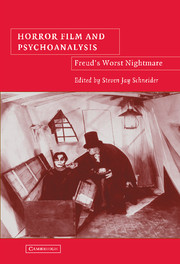Book contents
- Frontmatter
- Contents
- Acknowledgments
- Foreword: “What Lies Beneath?”
- Introduction: “Psychoanalysis in/and/of the Horror Film”
- PART ONE THE QUESTION OF HORROR-PLEASURE
- 1 “What's the Matter with Melanie?”: Reflections on the Merits of Psychoanalytic Approaches to Modern Horror Cinema
- 2 A Fun Night Out: Horror and Other Pleasures of the Cinema
- 3 Excerpt from “Why Horror? The Peculiar Pleasures of a Popular Genre,” with a New Afterword by the Author
- 4 Philosophical Problems Concerning the Concept of Pleasure in Psychoanalytical Theories of (the Horror) Film
- PART TWO THEORIZING THE UNCANNY
- PART THREE REPRESENTING PSYCHOANALYSIS
- PART FOUR NEW DIRECTIONS
- Afterword: Psychoanalysis and the Horror Film
- About the Contributors
- Bibliography
- Index
4 - Philosophical Problems Concerning the Concept of Pleasure in Psychoanalytical Theories of (the Horror) Film
Published online by Cambridge University Press: 14 July 2009
- Frontmatter
- Contents
- Acknowledgments
- Foreword: “What Lies Beneath?”
- Introduction: “Psychoanalysis in/and/of the Horror Film”
- PART ONE THE QUESTION OF HORROR-PLEASURE
- 1 “What's the Matter with Melanie?”: Reflections on the Merits of Psychoanalytic Approaches to Modern Horror Cinema
- 2 A Fun Night Out: Horror and Other Pleasures of the Cinema
- 3 Excerpt from “Why Horror? The Peculiar Pleasures of a Popular Genre,” with a New Afterword by the Author
- 4 Philosophical Problems Concerning the Concept of Pleasure in Psychoanalytical Theories of (the Horror) Film
- PART TWO THEORIZING THE UNCANNY
- PART THREE REPRESENTING PSYCHOANALYSIS
- PART FOUR NEW DIRECTIONS
- Afterword: Psychoanalysis and the Horror Film
- About the Contributors
- Bibliography
- Index
Summary
Psychoanalysis, once the dominant theoretical paradigm in cinema studies, has not fared well since the mid-1980s. New theoretical paradigms have arisen, creating a pluralism in the field. More importantly, psychoanalytical film theory has been subjected to a trenchant critique by analytical philosophers as well as film theorists informed by contemporary scientific and philosophical theories of mind. Some have criticized its basic premises and methodology. Noël Carroll (1988), for example, has pointed to numerous flaws in its founding analogies between cinematic phenomena and the irrational phenomena (putatively) explained by psychoanalysis. David Bordwell (1989) has shown how psychoanalytical film theorists of the past failed to adhere to even the most basic empirical and logical protocols of theory-building and instead simply integrated psychoanalytic concepts into traditional humanistic interpretive practices. Others, such as Murray Smith (1995) and Jeff Smith (1996), have pointed to the considerable failings of psychoanalytical theories of specific cinematic phenomena, such as identification and film music. The silence of psychoanalytical film theorists in the face of this critique – the fact that they have not attempted to systematically refute it or to reconstruct their theories in a dialectical response to it – is, I think, ample testimony to its power.
Although devastating for psychoanalytical film theories of the past, nothing about this critique rules out the possibility that there might be more successful psychoanalytical film theories in the future, for this critique is aimed at the failure to date of film theorists to build rigorous, plausible psychoanalytical theories, not the scientific or philosophical legitimacy of psychoanalysis itself.
- Type
- Chapter
- Information
- Horror Film and PsychoanalysisFreud's Worst Nightmare, pp. 68 - 84Publisher: Cambridge University PressPrint publication year: 2004
- 1
- Cited by



